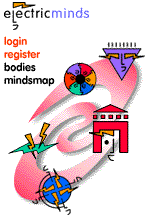
|

|
 Being Here Being Here
As the start of a monthly series, Being Here looks at Read below for questions, not answers. We will work together in the Being Here conference to gather resources and think about diversity online, and the best of those answers will appear here throughout February. We all have our impressions of who is online - ask a handful of people, and most will tell you that they think Internet users are predominately white, upper middle class and under forty. But does online demography map quite so neatly to marketing categories? What about users who are not from the United States? Who is using the Web worldwide? And how extensive is the online territory for those who speak languages other than English? Who is gaining access to the 'net both within and outside the United States? Again, ask a few people and you'll find that most people believe that economics dictate access. Is there really a widening gulf between the wealthy wired and those whose educational and job opportunities aren't buying status as an Internet citizen? Does it really break down along such Marxist lines? Maybe. But maybe not. What percentage of the online population is comprised of people of color? This does not seem to be a question that researchers have asked in any significant depth. A look at Yahoo reveals a collection of surveys about general demographics, interests, and attitudes but very little about ethnicity. As sites oriented to specific audiences such as NetNoir, ABC Flash, Moderna and Gravity grow in number, it's puzzling why the need to collect such data has fallen under the radar of market researchers. We found breakdowns of 'net users by astrological sign; we even found a report on which late night talk show host people online prefer. But we located startlingly few assessments indicating the ethnic breakdown of who is using the 'net. Here's one look at ethnicity information (yes, we have sent email to IMAS about the spelling error). We were stymied in our attempts to find links to other similar resources. Answers to other questions were easier to find and examine over time. For example, GVU's WWW User Surveys track information about gender and other categories from early 1994 through the end of 1996. These are just some of the questions that will help us understand who is online. You probably have more. Below are some starting-point resources for investigating online demographics. In the Being Here conference conference, we are discussing the validity of these findings and are sharing other resources which we can add to this list. Read here, surf around, and come back with links and ideas about how to get the fullest possible picture of online diversity. -Jill Davidson |
jfxo said: Being relatively new to any online community, I must admit that there is a tendency for relationships to develop at a greatly accelerated pace in the online world. I think this phenomenon has a lot to do with the one-dimensionality of using text to express one's emotions, and the limited number of inferences one can make from pure text (as opposed to, say, a face-to-face encounter) statements. So one has to be very careful when making acquaintances online, because the usual body- and voice-language inflections are not available to help one ascertain meaning in what is said. Most Active Topics: Topic 9 That is so rude! Topic 21 Advice to your favorite oldie Topic 26 Identity Hacking | |||
|
| ||||
Also in Being Here: Community Networking Diversity Online Netiquette | ||||
|
|
|
electric minds |
virtual community center |
world wide jam |
edge tech |
tomorrow |
conversations
Any questions? We have answers.
©1996, 1997 electric minds, all rights reserved worldwide.
|
